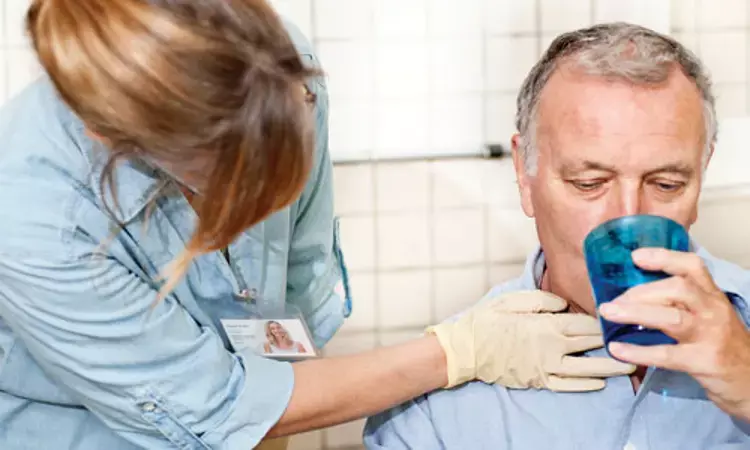- Home
- Medical news & Guidelines
- Anesthesiology
- Cardiology and CTVS
- Critical Care
- Dentistry
- Dermatology
- Diabetes and Endocrinology
- ENT
- Gastroenterology
- Medicine
- Nephrology
- Neurology
- Obstretics-Gynaecology
- Oncology
- Ophthalmology
- Orthopaedics
- Pediatrics-Neonatology
- Psychiatry
- Pulmonology
- Radiology
- Surgery
- Urology
- Laboratory Medicine
- Diet
- Nursing
- Paramedical
- Physiotherapy
- Health news
- Fact Check
- Bone Health Fact Check
- Brain Health Fact Check
- Cancer Related Fact Check
- Child Care Fact Check
- Dental and oral health fact check
- Diabetes and metabolic health fact check
- Diet and Nutrition Fact Check
- Eye and ENT Care Fact Check
- Fitness fact check
- Gut health fact check
- Heart health fact check
- Kidney health fact check
- Medical education fact check
- Men's health fact check
- Respiratory fact check
- Skin and hair care fact check
- Vaccine and Immunization fact check
- Women's health fact check
- AYUSH
- State News
- Andaman and Nicobar Islands
- Andhra Pradesh
- Arunachal Pradesh
- Assam
- Bihar
- Chandigarh
- Chattisgarh
- Dadra and Nagar Haveli
- Daman and Diu
- Delhi
- Goa
- Gujarat
- Haryana
- Himachal Pradesh
- Jammu & Kashmir
- Jharkhand
- Karnataka
- Kerala
- Ladakh
- Lakshadweep
- Madhya Pradesh
- Maharashtra
- Manipur
- Meghalaya
- Mizoram
- Nagaland
- Odisha
- Puducherry
- Punjab
- Rajasthan
- Sikkim
- Tamil Nadu
- Telangana
- Tripura
- Uttar Pradesh
- Uttrakhand
- West Bengal
- Medical Education
- Industry
Swallowing Maneuvers improve Dysphagia in Stroke Patients: Study

Dysphagia affects more than half of those who have had stroke. Fortunately, most of these individuals regain swallowing function within a week. Simple swallowing techniques and maneuvers can improve the symptoms of dysphagia in patients with circulation stroke.
Dr. Ayan Ghosal and colleagues from West Bengal carried out a study to quantify the symptomatic improvement of swallowing in patients. The findings were published in the Indian Journal of Physical Medicine and Rehabilitation on June 2021.
This prospective study was carried over 12 months and 15 patients were included in the Videofluoroscopic swallowing study (VFSS) post 2 weeks of stroke. They were evaluated for swallowing technique of head rotation to the paretic side at baseline and at 3-month interval.
Key findings of the study:
The patients with posterior circulation stroke and swallowing difficulties were mostly pharyngeal, and VFSS was an important element to examine and identify silent aspiration in these patients
In patients with posterior circulation stroke, the compensatory approach of rotating the neck to the paretic side showed improvement in dysphagia symptoms.
The study also suggested that videofluoroscopy can be used to objectively measure the different swallowing methods and maneuvers to improve dysphagia symptoms.
There was statistically significant improvement in both the Videofluoroscopic Dysphagia Scale (VDS) and Visual Analogue Scale of swallowing (VASs) in follow up visits after Swallowing therapy.
The Principal Author of this study concluded "Simple swallowing techniques and maneuvers can improve the symptoms of dysphagia in patients with posterior circulation stroke. Videofluoroscopy is helpful to diagnose and objectively quantify the improvement of dysphagia symptoms with different swallowing techniques and maneuvers".
For further insight
Ghosal A, Kumar De S, Sinharay S, et al. Improvement Pattern of VFSS due to Swallowing Maneuvers in Patients of Dysphagia with Posterior Circulation Stroke. Indian J Phys Med Rehab 2020;31(2):24–30
Medical Dialogues consists of a team of passionate medical/scientific writers, led by doctors and healthcare researchers. Our team efforts to bring you updated and timely news about the important happenings of the medical and healthcare sector. Our editorial team can be reached at editorial@medicaldialogues.in.
Dr Kamal Kant Kohli-MBBS, DTCD- a chest specialist with more than 30 years of practice and a flair for writing clinical articles, Dr Kamal Kant Kohli joined Medical Dialogues as a Chief Editor of Medical News. Besides writing articles, as an editor, he proofreads and verifies all the medical content published on Medical Dialogues including those coming from journals, studies,medical conferences,guidelines etc. Email: drkohli@medicaldialogues.in. Contact no. 011-43720751


